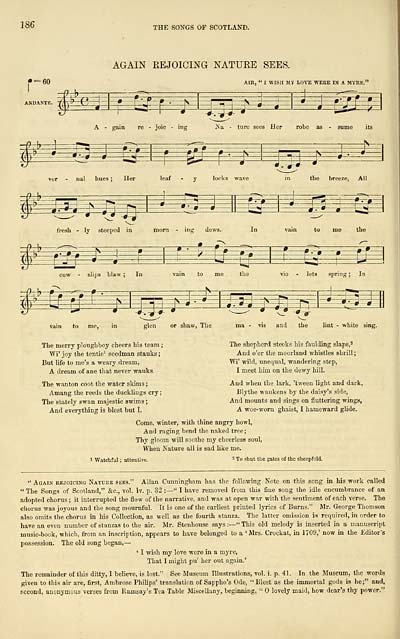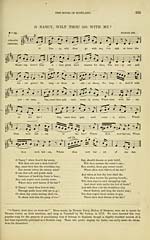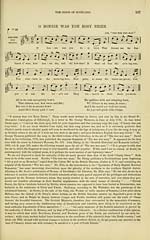Glen Collection of printed music > Printed music > Wood's edition of the songs of Scotland
(210) Page 186 - Again rejoicing nature sees
Download files
Complete book:
Individual page:
Thumbnail gallery: Grid view | List view

186
THE SONGS OF SCOTLAND.
AGAIN REJOICING NATURE SEES.
AIR. " I WISH MY LOVE WEKE IN A MYRE.
A - gain re - joic - ing
Na - ture sees Her robe as - sume ita
i
i=±
f^=T=^ ^^
jiJZJZ
*=U2=:
nal hues ; Her
f&
leaf - y locks wave
the breeze, All
3^
3F
-1
ly steeped in
fresh
morn - ing dews.
In
the
Twr-
m
N \'—* E
igE=gi
-j—^Jtz
HE
cow - slips blaw ; In vain to me the vio - lets spring ; In
fetfci=^
l\
t
s
SS^Ses
vain to me, in
glen or shaw, The ma - vis and the lint - white sing.
The merry ploughboy cheers his team ;
Wi' joy the tentie 1 seedman stauks ;
But life to me's a weary dream,
A dream of ane that never wauks.
The shepherd stecks his faulding slaps, 2
And o'er the moorland whistles shrill ;
Wi' wild, unequal, wandering step,
I meet him on the dewy hill.
And when the lark, 'tween light and dark,
Blythe waukens by the daisy's side,
And mounts and sings on fluttering wings,
A woe-worn ghaist, I hameward glide.
The wanton coot the water skims ;
Amang the reeds the ducklings cry;
The stately swan majestic swims ;
And everything is blest but I.
Come, winter, with thine angry howl,
And raging bend the naked tree;
Thy gloom will soothe my cheerless soul,
When Nature all is sad like me.
1 Watchful ; attentive. - To shut the gates of the sheepfold.
" Again rejoicing Nature sees." Allan Cunningham has the following Note on this song in his work called
" The Songs of Scotland," &c, vol. iv. p. 32 : — " I have removed from this fine song the idle encumbrance of an
adopted chorus ; it interrupted the flow of the narrative, and was at open war with the sentiment of each verse. The
chorus was joyous and the song mournful. It is one of the earliest printed lyrics of Burns." Mr. George Thomson
also omits the chorus in his Collection, as well as the fourth stanza. The latter omission is required, in order to
have an even number of stanzas to the air. Mr. Stenhouse says :— " This old melody is inserted in a manuscript
music-book, which, from an inscription, appears to have belonged to a 'Mrs. Crockat, in 1709,' now in the Editors
possession. The old song began, —
' I wish my love were in a myre,
That I might pu' her out again.'
The remainder of this ditty, I believe, is lost." See Museum Illustrations, vol. i. p. 41. In the Museum, the words
given to this air are, first, Ambrose Philips' translation of Sappho's Ode, "Blest as the immortal gods is he;" and,
second, anonymous verses from Ramsay's Tea-Table Miscellany, beginning, " lovely maid, how dear's thy power."
THE SONGS OF SCOTLAND.
AGAIN REJOICING NATURE SEES.
AIR. " I WISH MY LOVE WEKE IN A MYRE.
A - gain re - joic - ing
Na - ture sees Her robe as - sume ita
i
i=±
f^=T=^ ^^
jiJZJZ
*=U2=:
nal hues ; Her
f&
leaf - y locks wave
the breeze, All
3^
3F
-1
ly steeped in
fresh
morn - ing dews.
In
the
Twr-
m
N \'—* E
igE=gi
-j—^Jtz
HE
cow - slips blaw ; In vain to me the vio - lets spring ; In
fetfci=^
l\
t
s
SS^Ses
vain to me, in
glen or shaw, The ma - vis and the lint - white sing.
The merry ploughboy cheers his team ;
Wi' joy the tentie 1 seedman stauks ;
But life to me's a weary dream,
A dream of ane that never wauks.
The shepherd stecks his faulding slaps, 2
And o'er the moorland whistles shrill ;
Wi' wild, unequal, wandering step,
I meet him on the dewy hill.
And when the lark, 'tween light and dark,
Blythe waukens by the daisy's side,
And mounts and sings on fluttering wings,
A woe-worn ghaist, I hameward glide.
The wanton coot the water skims ;
Amang the reeds the ducklings cry;
The stately swan majestic swims ;
And everything is blest but I.
Come, winter, with thine angry howl,
And raging bend the naked tree;
Thy gloom will soothe my cheerless soul,
When Nature all is sad like me.
1 Watchful ; attentive. - To shut the gates of the sheepfold.
" Again rejoicing Nature sees." Allan Cunningham has the following Note on this song in his work called
" The Songs of Scotland," &c, vol. iv. p. 32 : — " I have removed from this fine song the idle encumbrance of an
adopted chorus ; it interrupted the flow of the narrative, and was at open war with the sentiment of each verse. The
chorus was joyous and the song mournful. It is one of the earliest printed lyrics of Burns." Mr. George Thomson
also omits the chorus in his Collection, as well as the fourth stanza. The latter omission is required, in order to
have an even number of stanzas to the air. Mr. Stenhouse says :— " This old melody is inserted in a manuscript
music-book, which, from an inscription, appears to have belonged to a 'Mrs. Crockat, in 1709,' now in the Editors
possession. The old song began, —
' I wish my love were in a myre,
That I might pu' her out again.'
The remainder of this ditty, I believe, is lost." See Museum Illustrations, vol. i. p. 41. In the Museum, the words
given to this air are, first, Ambrose Philips' translation of Sappho's Ode, "Blest as the immortal gods is he;" and,
second, anonymous verses from Ramsay's Tea-Table Miscellany, beginning, " lovely maid, how dear's thy power."
Set display mode to: Large image | Transcription
Images and transcriptions on this page, including medium image downloads, may be used under the Creative Commons Attribution 4.0 International Licence unless otherwise stated. ![]()
| Special collections of printed music > Glen Collection of printed music > Printed music > Wood's edition of the songs of Scotland > (210) Page 186 - Again rejoicing nature sees |
|---|
| Permanent URL | https://digital.nls.uk/91340263 |
|---|
| Description | Scottish songs and music of the 18th and early 19th centuries, including music for the Highland bagpipe. These are selected items from the collection of John Glen (1833 to 1904). Also includes a few manuscripts, some treatises, and other books on the subject. |
|---|
| Description | The Glen Collection and the Inglis Collection represent mainly 18th and 19th century Scottish music, including Scottish songs. The collections of Berlioz and Verdi collected by bibliographer Cecil Hopkinson contain contemporary and later editions of the works of the two composers Berlioz and Verdi. |
|---|

